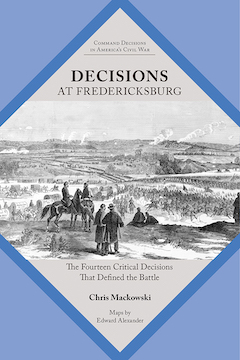Question of the Week: 12/13/21-12/19/21
 I was delighted to come home from Tennessee the other day to find a box of books from, of all places, the University of Tennessee Press. It contained copies of my latest book, Decisions at Fredericksburg, published by UTP as part of its “Command Decisions” Series. In the book, I identify fourteen command decisions that defined the battle.
I was delighted to come home from Tennessee the other day to find a box of books from, of all places, the University of Tennessee Press. It contained copies of my latest book, Decisions at Fredericksburg, published by UTP as part of its “Command Decisions” Series. In the book, I identify fourteen command decisions that defined the battle.
What do YOU think are the most important command decisions of the battle of Fredericksburg?
I hope this answer does not appear to be overly synthetic, but the simple fact of ordering a frontal assault against an entrenched enemy…
1. Burnside’s decision to attack the dug-in Confederates. He should have been sacked from the Army for ordering that butchery.
2. The failure to support Meade’s Pennsylvanians after they punctured the Confederate line.
Going forward with the original plan when the element of surprise and flanking Lee was lost with the pontoon boat delay.
Ole Burn’s quandary was that, ‘doing nothing’ was not an option. The President wanted action prior to his releasing the Emancipation Proclamation. Doing a Left or Right Hook was not viable, so Burnside was left with going “high diddle diddle, right up the middle”.
The most important command decision at Fredericksburg? Going there!
I copied the following from Wikipedia. Didn’t have time to write it my self.
The amphibious crossing was inventive for its time.
Crossing the Rappahannock, December 11–12[edit]
Barksdale’s Mississippi brigade fires at the Union engineers
Union engineers began to assemble six pontoon bridges before dawn on December 11, two just north of the town center, a third on the southern end of town, and three farther south, near the confluence of the Rappahannock and Deep Run. The engineers constructing the bridge directly across from the city came under punishing fire from Confederate sharpshooters, primarily from the Mississippi brigade of Brig. Gen. William Barksdale, in command of the town defenses. Union artillery attempted to dislodge the sharpshooters, but their positions in the cellars of houses rendered the fire from 150 guns mostly ineffective. Eventually Burnside’s artillery commander, Brig. Gen. Henry J. Hunt, convinced him to send infantry landing parties over in the pontoon boats to secure a small bridgehead and rout the sharpshooters. Col. Norman J. Hall volunteered his brigade for this assignment. Burnside suddenly turned reluctant, lamenting to Hall in front of his men that “the effort meant death to most of those who should undertake the voyage.” When his men responded to Hall’s request with three cheers, Burnside relented. At 3:00 p.m., the Union artillery began a preparatory bombardment and 135 infantrymen from the 7th Michigan and the 19th Massachusetts crowded into the small boats, and the 20th Massachusetts followed soon after. They crossed successfully and spread out in a skirmish line to clear the sharpshooters. Although some of the Confederates surrendered, fighting proceeded street by street through the town as the engineers completed the bridges. Sumner’s Right Grand Division began crossing at 4:30 p.m., but the bulk of his men did not cross until December 12. Hooker’s Center Grand Division crossed on December 13, using both the northern and southern bridges.[23]
Burnside is in an unwinnable situation. He can’t flank right, the Confeds would see it and have time to react. Going straight ahead would lead to, well, we know…. Flanking left there are no good river crossings. I’d say the crucial decision was before the army got there… deciding to move on F’burg and not having the pontoons ready. Burnside perhaps could have tried to move overland, to the west, the way Grant would later.
I’d go with the cumulative “decisions” by Gibbon/Birney/Reynolds and Franklin by which they failed to support the breakthrough by Meade/exploit the gap on the ANV’s left on December 13. Sitting on your haunches is a decision. I don’t know if it would have changed the ultimate result but it sure could have made things interesting.
Being direction-challenged unless I’m in the back country on a climbing frolic, I meant the ANV’s “right”. Put down the mirror …..
Franklin not telegraphing for clarification when the written orders he got from Burnside did not accord with the verbal instructions he received the night before.
I like that one, as well. And I can’t wait to have the book delivered so I can find out whether Chris deked all of us.